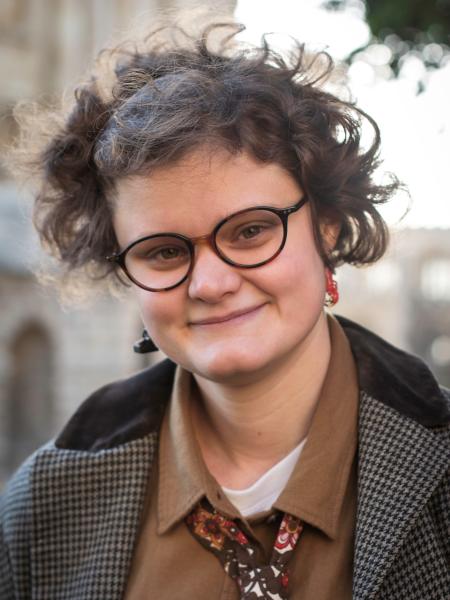
Maddy Chalmers, a 2nd year DPhil student at Trinity has just been awarded the prestigious Gapper Postgraduate Essay Prize by the Society for French Studies for an essay described by the judges as ‘a stimulating and innovative piece of work, written with considerable flair’. She will receive the award at the Society’s Annual conference in London in July.
Tell us a little about your DPhil research.
My DPhil project (funded by the Oxford AHRC DTP – Sir Ivor Roberts Graduate Scholarship at Trinity College) explores how avant-garde French literature of the late nineteenth and early twentieth centuries negotiates the increasingly tight imbrication of technology into human life, and the challenge it poses to how we think about ourselves, our relationship to others and to our world. I’m particularly interested in the intertwining of these ‘historic’ avant-garde texts with the evolution of technological thinking in France, up to the present day (and into the future).
What is the subject of your recent prize-winning essay?
My essay brings together two apparently unnatural twentieth-century bedfellows: Gilbert Simondon, France's critically fashionable (re)thinker of technology and ontology, and André Breton, the dogmatic pope of surrealism (currently enjoying a downturn in his critical fortunes). The two writers have never been brought together, but in a coda to his major work L'Individuation à la lumière des notions de forme et d'information, Simondon turns explicitly to surrealism to think technology. The essay unpacks what the two have in common, and how Simondon extends Breton’s thinking about the different processes by which things are brought into being, changed, destroyed, and rendered obsolete. It is about who or what has authority over these processes, and whether such authority is genuine or illusory; about chance, evolution, instinct, and imagination; about how we find a place in the world, and about how what we produce takes on a life beyond us.
What topic are you writing about now?
I’m currently working on an article about what prehistoric cave art can tell us about technology, but I’m also chipping away at the third chapter of my thesis, on the enigmatic Raymond Roussel and the notion of computational thinking. Some of that material also forms part of a chapter I am writing for a French edited volume.
Which text in your corpus would you suggest everyone should read? And why?
The utterly obscure Ignis (1883) by the equally obscure and enigmatic Didier de Chousy. Comedy of the blackest hue, far ahead of its time, which takes satirical potshots at British imperialism, fracking, full automation, and the notion of ‘reality’ – and ends with a pair of singed trousers and the revelation that ‘it was all a dream’. How it gets there has to be read to be believed.
Can you please say a few words about the postgraduate conference you are about to organise in Oxford?
One of the joys of postgraduate study is working with other postgraduates. On 2 March, with the generous support of Prof. Catriona Seth, All Souls will host the annual Association for the Study of Modern and Contemporary France – Society for the Study of French History Postgraduate Study Day, which I am co-organising with colleagues from Southampton and Queen Mary University of London. The theme of ‘Visibility | Invisibility’ has generated an eclectic programme which amply reflects the diversity, ambition, and originality of postgraduate work in French studies.
I’m also looking forward to lending a logistical hand for the international ‘Thinking with Jean-Luc Nancy’ conference, organised by Marie Chabbert and Nikolaas Deketelaere: a landmark event, helmed by two brilliant postgraduates, paying tribute to one of France’s most eminent living philosophers.
And finally, tell us about your TORCH (The Oxford Research Centre for the Humanities) network
It’s been a pleasure to co-convene the TORCH network ‘Life Itself in Theory and Practice’ – the brainchild of Sam Gormley, a fellow DPhil student in French who does phenomenal work on contemporary French speculative fiction and what it has to say about notions of life and the human. It has been a privilege to be part of his initiative to bring together researchers from across the sciences and humanities, and to think through the increasingly entangled relationship between art, thought, and culture and developments in genetics, biotechnology, and information technology, via talks on ethnic conflict, Leibniz, digital afterlives, to name but a few.